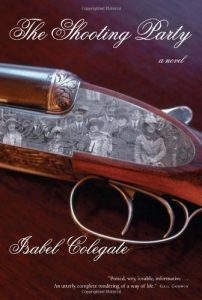It is the autumn of 1913. Sir Randolph Nettleby has assembled a brilliant array of guests at his Oxfordshire estate for the biggest hunt of the season. An army of gamekeepers, beaters, and servants has rehearsed the intricate age-old ritual, the gentlemen are falling into the prescribed mode of fellowship and sporting rivalry, the ladies intrigued by the latest gossip and fashion. Everything about this splendid weekend would seem a perfect consummation of the pleasures afforded the privileged in Edwardian England. And yet it is not: the moral and social code of this group is not so secure as it appears. Competition beyond the bounds of sportsmanship, revulsion at the slaughter of the animals, anger at the inequities of class --these forces are about to rise up and engulf the assured social peace, a peace that can last only a brief while longer. In imagining Sir Randolph's shooting party, wrote The Spectator, Miss Colegate has found a perfect metaphor for the passing of a way of life.
The Shooting Party
Sobre
Talvez você seja redirecionado para outro site












